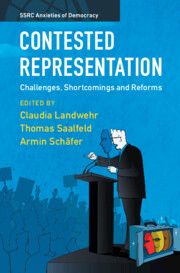Book contents
- Contested Representation
- SSRC Anxieties of Democracy
- Sponsored by the Social Science Research Council
- Contested Representation
- Copyright page
- Contents
- Figures
- Tables
- Contributors
- Acknowledgments
- 1 Introduction
- Part I The Contested Idea of Political Representation
- Part II Representation and Responsiveness in Unequal Societies
- 7 Reconsidering Representation
- 8 All about the Middle Class?
- 9 Unequal Representation and the Right-Wing Populist Vote in Europe
- 10 What Do Voters Think about the Descriptive Underrepresentation of the Working Class?
- Part III Polarization, New Cleavages, and Shifts in Democratic Government
- Part IV Constitutional Crisis and Institutional Reform
- Bibliography
- Index
8 - All about the Middle Class?
(Un)equal Responsiveness in Social and Education Policy
from Part II - Representation and Responsiveness in Unequal Societies
Published online by Cambridge University Press: 03 November 2022
- Contested Representation
- SSRC Anxieties of Democracy
- Sponsored by the Social Science Research Council
- Contested Representation
- Copyright page
- Contents
- Figures
- Tables
- Contributors
- Acknowledgments
- 1 Introduction
- Part I The Contested Idea of Political Representation
- Part II Representation and Responsiveness in Unequal Societies
- 7 Reconsidering Representation
- 8 All about the Middle Class?
- 9 Unequal Representation and the Right-Wing Populist Vote in Europe
- 10 What Do Voters Think about the Descriptive Underrepresentation of the Working Class?
- Part III Polarization, New Cleavages, and Shifts in Democratic Government
- Part IV Constitutional Crisis and Institutional Reform
- Bibliography
- Index
Summary
Contemporary welfare states in advanced post-industrial democracies have been under pressure for some time, dealing with multiple challenges such as population aging, globalization and technological change. Initially, scholars focused on pointing out how a fiscal policy climate of “permanent austerity” (Pierson 2001) constrains the leeway for expansionary reform. Over time, however, observers noted that welfare state retrenchment is not “the only game left in town” (Van Kersbergen et al. 2014). Instead, welfare states have undergone and are still undergoing a significant transformation from a more transfer- and insurance-based model towards a “social investment” model (Bonoli 2013; Hemerijck 2013, 2017, 2018; Morel et al. 2012), in which the creation, mobilization and preservation of human capital and skills are central (Garritzmann et al. 2017). For sure, there are significant cross-country differences in the extent to which the transformation towards the social investment model has occurred, depending on particular institutional, political and socio-economic contexts. Yet, the overall trend is clearly discernible.
- Type
- Chapter
- Information
- Contested RepresentationChallenges, Shortcomings and Reforms, pp. 129 - 146Publisher: Cambridge University PressPrint publication year: 2022



